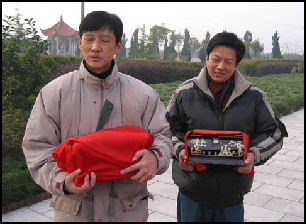Cremation in China is quickly approaching the same level of popularity that it has developed in the last few decades across the world. Latest statistics show that nearly 46 percent of Chinese deaths result in cremation. That’s up from about 15 percent in the mid-20th century. But, for proponents of cremation, the current Chinese numbers may be a bit discouraging. See, in most places in China, cremation is required by law.
Under communist rule in China in the 1940’s, officials banned traditional burial and mandated that all deaths require cremation. In doing this, they cited all of the usual arguments in support of cremation. They said burial in a cemetery was a waste of space, harmful to the environment, and much more expensive than cremation. In many cases, the new laws were not in conflict with tradition since China’s population is home to many Buddhists who have long turned to cremation as their method of choice. (It is important to note that Buddha does not specifically require cremation, in fact, the religion’s major texts are almost silent on the topic. That said, tradition tends to encourage the practice of cremation.)
Traditional in family and community cemeteries remains common place throughout rural China today despite the requirement for cremation, and it remains to be seen if government officials will ever take drastic measures to enforce their laws against burial. In the meantime, it seems that cremation is not universally accepted as an ideal choice, even among those who live in large cities and
 typically submit to the rule. Political dissent in China, even on matters such as this, is often met with stern enforcement that typically keeps critics quiet. But, in this case, there is an bit of an indication that the cremation requirement might not sit well, if it were ever put to a popular vote. “If it’s legal when I die, I want to be buried, not cremated,” one man in the city of Liuzhou told a foreign reporter one day.
typically submit to the rule. Political dissent in China, even on matters such as this, is often met with stern enforcement that typically keeps critics quiet. But, in this case, there is an bit of an indication that the cremation requirement might not sit well, if it were ever put to a popular vote. “If it’s legal when I die, I want to be buried, not cremated,” one man in the city of Liuzhou told a foreign reporter one day.
Ashes of the deceased Funerary customs can be quite complex, vary greatly from region and region and incorporate elements of Confucianism, Buddhism, Taoism, shamanism, local folk religions, ancient ancestor worship traditions and Communist ideology. Often no stone is left unturned in an effort to address and eliminate all potentials for harm.
The Chinese have traditionally regarded it critical for the dead to be buried. Among the Chinese there is no higher good deed than burying stray bones or covering an uncovered coffins. Confucius said that immediate disposal of the dead was a sign of virtue, submission, love and respect towards one's elders and superiors.
Reporting and Registering a Death
As soon as a death occurs, notify the police and/or the local doctor who has previously attended the deceased. There is a legal requirement to register a death within 24 hours of its occurrence.The doctor will issue a Medical Certificate of the Cause of Death (also known as form 18). This has identification of the deceased and basic details concerning the death. If death occurred in hospital, the hospital authorities will see to this paperwork. The police or ambulance service will then transport the deceased to a public mortuary.